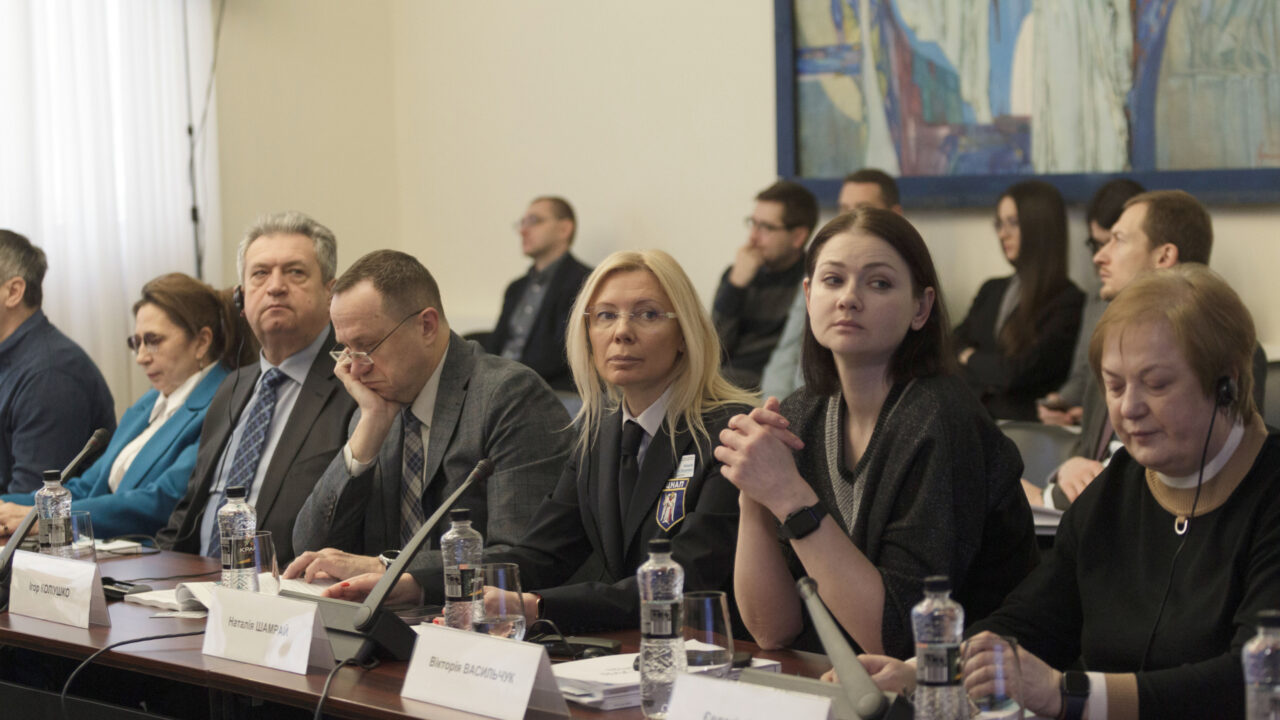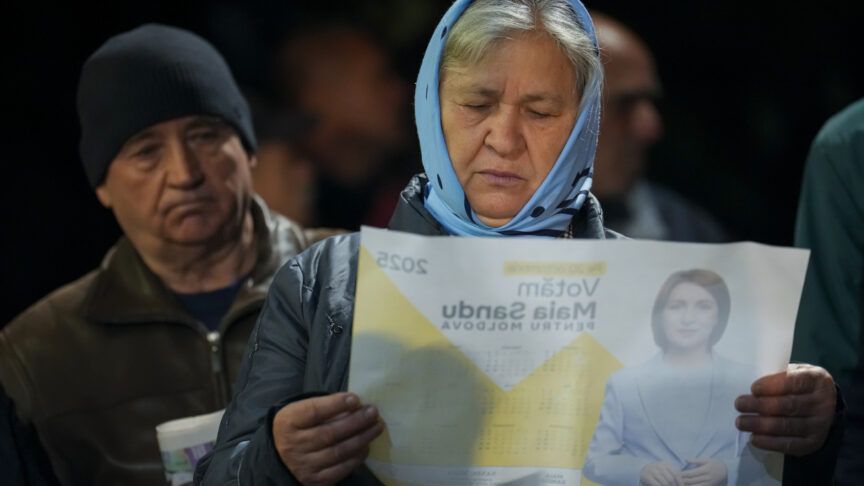Greasing the gears: Readying Ukraine’s civil service for a European future
Away from Ukraine’s frontlines, its civil servants are leading the country towards EU membership – but huge reforms are needed if they are to be successful
In the initial weeks and months of the full-scale Russian invasion of Ukraine, it was not only the country’s military that held its ground, but also Ukraine’s less visible army – its civil servants. At the time, the two were even comparable in size, with around 261,000 members of the armed forces and 208,000 civil servants.
Ukraine’s civil service swiftly transitioned to emergency mode by relocating, adopting more agile working practices, and expediting decision-making. This resilience ensured that public services continued and state institutions functioned as well as they could under conditions of war. This was even while many civil servants themselves had to move or left to join the army. Their resilience also helped address the reputation for corruption that had grown up around Ukraine: if the state really had been hollowed out by graft, it would have collapsed in a matter of days.
However, perhaps the Ukrainian civil service’s most noteworthy accomplishment is its work on European integration. Just four days after Russia attacked, Ukraine applied to join the European Union. When, in April 2022, European Commission president Ursula von der Leyen symbolically handed over the questionnaire that is an integral part of the membership process, she remarked that Ukraine would take weeks, rather than the usual years, to complete it. She was right: the following month, Ukraine’s civil service, with support from the country’s expert community and civil society, officially submitted over 5,000 pages in response.
Despite these remarkable achievements, public support for Ukraine’s state apparatus remains low, with a trust-distrust rating of minus 46 per cent. In contrast, the armed forces enjoy a positive 90 per cent rating. Yet, it is precisely the civil service that will need to ‘win the peace’ after the army wins the war on the battlefield. This is especially important for Ukraine’s EU journey and the country’s recovery and reconstruction. It is therefore crucial for Ukraine and its international partners to invest in the capacities of civil servants. To do this, they will need to address several main challenges.
It is precisely the civil service that will need to win the peace after the army wins the war on the battlefield
Firstly, a career in the civil service in Ukraine has never been a prestigious role. The political turmoil that engulfed early post-Soviet Ukraine may have been largely fuelled by scandals and mismanagement on the part of politicians. But one effect of this was the creation of negative perceptions about the public administration. A vicious cycle developed in which the recruitment of talented and motivated teams in ministries and regional authorities is hindered by the deeply ingrained populist conviction in society that civil servants should be poorly paid. This remains a problem, as Ukraine’s budget struggles to cover social payments during wartime, low public sector wages have been reduced even further. As a result, ministries are understaffed even while they grapple with the profound challenges created by the invasion.
Secondly, the Ukrainian civil service lacks a robust policymaking tradition. During Soviet times, officials’ role was to transpose the decisions made in Moscow into its legislation in Ukraine. Consequently, the policymaking cycle of identifying a problem, developing a solution, assessing the implications, and carrying out inclusive stakeholder consultations was never an established norm. This left civil servants with little to build on in the democratic era. As a result, many citizens do not feel part of the emergence or implementation of policy that is supposed to benefit them, helping drive low levels of trust.
Finally, the state administration’s capacity and readiness to conduct negotiations with the EU appear unpromising. Kyiv and the commission are expected to agree on the negotiation framework in the coming months. However, efforts by European partners to help the Ukrainian civil service develop their skills and capacity are fragmented. They have so far proved insufficient to have a systemic impact, and ministries in any case find it challenging to send personnel for training workshops abroad without disrupting their work in Kyiv.
At the same time, Ukraine’s civil servants lack sufficient knowledge about the EU’s official procedures and formal expectations around correspondence, and how to develop and submit documents in the ways required. This could significantly impede the process of preparing Ukraine to implement the acquis. In negotiations with the EU, a key task for Ukraine will be to negotiate transitional arrangements, and to postpone certain challenging requirements, such as the agricultural or environmental provisions. Achieving this will oblige negotiating teams to possess a comprehensive understanding of the negotiation process and EU legislative policymaking cycle. They will need to know how to adjust their own official processes, formulate correspondence correctly, and master other related skills.
To address these urgent challenges, the EU and Ukraine must implement a comprehensive strategy to support the country’s civil service.
Primarily, Ukraine’s current leadership needs to express a political commitment to prioritise public administration reform. The neglect of this sphere might have been somewhat understandable four years ago given the minimal political experience held by President Volodymyr Zelensky and his party of newcomers. Before the war, their approach was to attempt to apply a business logic to bureaucracy, and as a consequence, they effectively suspended many of the provisions that were in place under the public administration reform programme started under the previous political leadership in 2016 with support of the EU. This has hindered progress on the front of good governance. However, after almost a full term for both president and parliament, there should now be an understanding of the crucial role civil servants play in implementing policy changes. Over the past few years, Ukraine’s civil society and international partners, including the EU, have been less active than in other policy areas in pushing for civil service reform. They can help to persuade the government to prioritise this.
The EU should reassess its public administration reform assistance, understanding that the war changes everything and demands a revised approach. For example, in 2017 the EU helped introduce a complex multi-stage hiring process for civil servants working on reform, which may have deterred motivated candidates with limited prior experience in public administration. It was suspended in 2020. In contrast, a more agile approach, recently adopted by Kyiv, to forming project teams in key governmental bodies has already proven successful. For example, Ukraine’s newest government department, the Ministry of Digital Transformation, established in 2019, effectively brings together the civil service and non-bureaucrats to work on joint projects. Numerous IT businesses provide backing to the ministry by undertaking outsourced functions on its behalf. Alongside this, international donors have set up external project management offices attached to the ministry that help implement various state programmes. All this contributes to the development of capable teams operating in a startup culture. While this may be less sustainable outside of wartime circumstances, where the state must rapidly adapt to emerging challenges, a flexible project management approach pays greater dividends than a sluggish bureaucratic culture. Although systemic changes are imperative for reforming Ukraine’s public administration, support from donors for these sorts of agile solutions in key ministries would be a valuable asset in the present context. The recently approved plan for the implementation of the Ukraine Facility should allow for such flexibility.
To motivate those already in civil service – and especially civil servants directly involved in transposing EU laws into Ukrainian legislation – the EU and the Ukrainian government should ensure their salaries increase. This sort of scheme was in place during the previous presidency, which implemented that public administration has reform support specialists. These specialists are a unique type of official whose role is to reshape policymaking in line with European good governance standards and thereby contribute to undertaking key reforms. Previously, between 2016 and 2020, the EU’s macro-financial support to Ukraine was tied to progress in implementing public administration reform. This support included topping up the national budget to enable the payment of higher salaries for these reform specialists. A similar approach would now help support those in the state apparatus whose job it is to implement the EU acquis as soon as the EU approves the negotiation framework, expected this spring.
Finally, EU institutions, particularly the commission and European Parliament, along with countries from the last two waves of EU accession, should offer Ukraine extensive on-site training and experience-sharing sessions on the negotiation process, the negotiation framework, access to structural funds, and related topics for civil servants as well as representatives of the private sector and civil society. Ukraine’s own journey into the EU will, of course, be unique, given the reform that will be needed to EU decision-making processes and budget and structural funds allocation. Past knowledge can quickly become outdated, meaning that the EU should include Ukrainian civil servants in internal discussions around the shape of these reforms, in order to consider the perspective of a future member state.
The European Council on Foreign Relations does not take collective positions. ECFR publications only represent the views of their individual authors.



